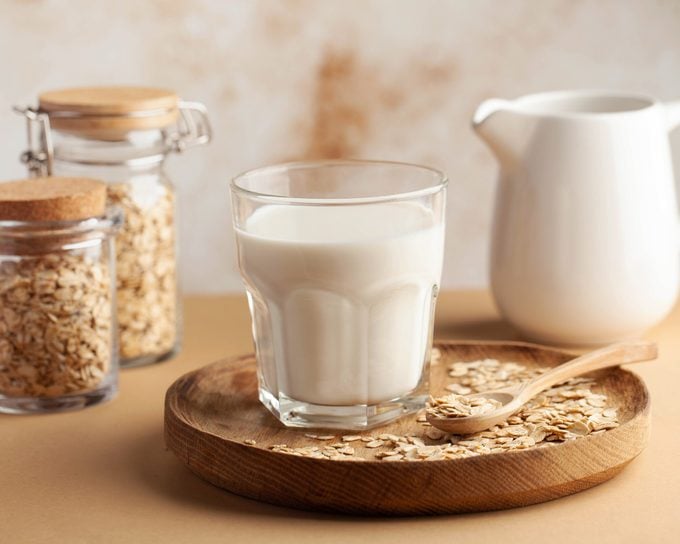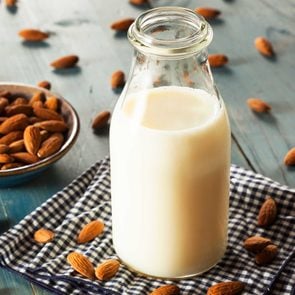Is Oat Milk Gluten Free?
Updated: Mar. 30, 2022
People who don't eat gluten should know all the facts before trying this beverage.
Our editors and experts handpick every product we feature. We may earn a commission from your purchases.
Oat milk is another popular alternative to whole milk
A few years ago, soy milk was one of the only non-dairy milk options available on the market. These days, I can’t seem to keep up with all the plant-based milk options hitting the grocery store.
Oat milk is the latest trendy addition to the non-dairy milk craze. People can’t seem to get enough oat milk, whether it’s in lattes or ice cream. It might be because oat milk tastes pretty close to the real thing. It’s thick and creamy and has a touch of natural sweetness, just like whole milk.
But it’s 100 percent plant-based, nut-free, and soy-free.
While oat milk may be an excellent alternative for plant-based foodies and people with food allergies and sensitivities, it may not be the best choice for people who follow a gluten-free diet.
Keep reading to find out why.
What is oat milk?
Most oat milk is made by adding rolled oats to water, blending the mixture together, then straining the pulp. The result is a non-dairy liquid that has a natural sweetness and creamy texture.
Packaged oat milks usually have a few more ingredients like added vitamins and minerals, flavoring, and sometimes stabilizers, gums, preservatives, and sugar.
What is the nutrition value of oat milk?
Most oat milk is dairy-free, nut-free, and soy-free, but oat milk’s nutrition value varies pretty widely depending on the product. For example, some oat milks have added oils and sugars that drastically increase the product’s fat and carbohydrate content.
Others are fortified with additional vitamins and minerals, such as calcium and vitamin D, that we would normally find in a standard glass of milk.
One cup (240 ml) of a generic, unsweetened, and fortified oat milk has the following nutrients:
-
Calories: 139
-
Protein: 3 grams
-
Total Fat: 7 grams (9 percent of your Daily Value—DV)
-
Saturated Fat: 0.5 grams
-
Total Carbohydrates: 16 grams (6 percent DV)
-
Total Fiber: 1.9 grams (7 percent DV)
-
Calcium: 350 mg (25 percent DV)
-
Iron: 0.3 mg (2 percent DV)
-
Phosphorus: 269 mg (20 percent DV)
-
Potassium: 389 mg (8 percent DV)
-
Sodium: 101 mg (4 percent DV)
-
Riboflavin: 0.6 mg (45 percent DV)
-
Vitamin B12: 1.2 micrograms (50 percent DV)
In general, most oat milks have about the same number of calories as whole milk. Oat milk, however, has a somewhat higher carbohydrate content and a little less protein. But, unlike whole milk, oat milk has more fiber and little to no saturated fat, making it a great heart-healthy alternative to full-fat cow’s milk.

What you need to know about gluten
Gluten is a protein found in wheat, barley, rye, and other derivatives of these grains. It gives dough its elasticity and helps bind foods together, making it a common food additive in processed foods like condiments.
The popularity of gluten-free diets has skyrocketed in recent years. People embrace this diet trend to help with weight loss, digestive conditions, autoimmune disease, hormone imbalances, and even acne.
However, going gluten-free isn’t exactly the cure-all people imagine. Yes, some people benefit from following a gluten-free diet, but definitely not everyone.
Celiac disease
People with celiac disease, for example, need to follow a lifelong, strict gluten-free diet, suggests a report in Nature Reviews. Celiac disease is an autoimmune disease in which the ingestion of gluten triggers the immune system to attack the small intestine, where the body absorbs gluten and other nutrients. This damages the small intestine’s absorptive cells, leading to serious health conditions over time, including malnutrition, impaired growth and development in children, bone weakening, infertility and miscarriage, cancer, seizures, and nerve damage.
Interestingly, preliminary research in the journal Experimental and Clinical Endocrinology & Diabetes suggests that people with other autoimmune conditions like Hashimoto’s hypothyroidism may also benefit from following a gluten-free diet.
Wheat allergies
A wheat allergy is an immune reaction to any of the hundreds of proteins found in wheat (not just gluten). People with wheat allergies produce a specific type of immune protein in response to wheat ingestions called immunoglobulin E (IgE). This allergic response happens quickly and can involve many symptoms, including nausea, abdominal pain, itching, swelling of the lips and tongue, trouble breathing, or anaphylaxis (a life-threatening reaction).
A person with a wheat allergy must avoid eating any form of wheat, but does not have trouble tolerating gluten from non-wheat sources—like barley, for example.
Gluten sensitivity
Non-celiac gluten sensitivity (NCGS) or gluten sensitivity is considered a medical condition, but it isn’t well-defined.
It’s not an IgE nor an autoimmune reaction. There are no tests or biomarkers to identify NCGS. Gluten sensitivity is diagnosed after ruling out celiac disease and wheat allergy or other possible causes of symptoms, and if there’s improvement after following a gluten-free diet.
People with NCGS may see an improvement in symptoms on a gluten-free diet, but typically don’t need to follow a strict gluten-free diet as those with celiac disease would have to.
The verdict isn’t out when it comes to gluten and other health conditions like IBS, acne, and obesity, so speak with a dietitian to help you navigate the wild world of gluten-free diets before committing to this elimination diet.
Is oat milk gluten-free?
If you fall into any of the categories above—celiac disease, wheat allergy, or non-celiac gluten sensitivity—it’s important for you to be aware that not all oat milk is gluten-free.
Oats are naturally gluten-free but are often contaminated with gluten because they are typically processed in the same facility and on the same equipment as other grains that contain gluten. (Here are other foods with gluten that will surprise you.)
Unfortunately, it’s difficult to know exactly how much gluten is in your average oat product. Most commercially available oats don’t test to see if they contain gluten.
There is some insight into the gluten content of oats from a review study in the Canadian Journal of Gastroenterology and Hepatology that found most oats in North America and Europe contain well over the recommended 20 parts per million (ppm) to be considered gluten-free.
That said, people with celiac disease and wheat allergies need to be especially careful about consuming oat products like oat milk because it may be likely that they too contain trace amounts of gluten.
What are the best gluten-free oat milk options?
Thankfully, many companies and facilities that make oat milk are aware of the cross-contamination issue with gluten and oats and make certified gluten-free products.
Here are a few of my favorite gluten-free oat milk brands;
Oatly
Oatly is the first major oat milk that hit the market, and remains one of the most popular oat milks out there. Based on their website, they only make their oat milk using certified gluten-free oats. All of their U.S. products are certified gluten-free by the Gluten-Free Certification Organization (GFCO).
Planet Oat, Elmhurst, and Califia Farms
Planet Oat, Elmhurst, and Califia Farms also make oat milk from gluten-free oats, however, according to their official websites, these claims have not been certified by a third party.
These options might be a good choice for people with non-celiac gluten sensitivity or people who have less severe reactions to gluten and don’t have to worry about cross-contamination.
People with celiac disease should stick with Oatly since it’s the only brand certified gluten-free by a third party tester.
Bottom line
Oat milk is a tasty and nutritious plant alternative to cow’s milk. It’s a great option for people who want a creamy, non-dairy option or have food allergies and intolerances to dairy products and nuts.
While oats are naturally gluten-free, they have a high risk of cross-contamination with gluten. Therefore, people with celiac disease and wheat allergies should choose certified gluten-free oat milk products to prevent health concerns related to cross-contamination of gluten in oats.
Depending on the individual, people with non-celiac gluten sensitivity may be less sensitive to cross-contamination and can potentially tolerate oat milk from non-certified gluten-free oats.





















